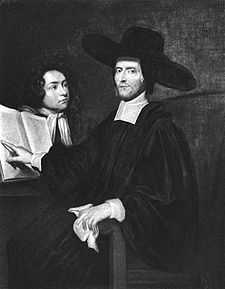Richard Busby
| Richard Busby | |
|---|---|
 | |
| Born |
22 September 1606 Lutton, Lincolnshire |
| Died |
6 April 1695[1] Westminster |
| Education | Christ Church, Oxford |
| Church | Church of England |
| Title | Head Master of Westminster School |
The Rev. Dr. Richard Busby (1606–1695) was an English Anglican priest who served as head master of Westminster School for more than fifty-five years.
Life
He was born at Lutton in Lincolnshire, and educated at Westminster, where he first showed his academic promise by gaining a King's Scholarship. From Westminster, Busby duly proceeded to Christ Church, Oxford, graduating in 1628. In his thirty-third year he had already become renowned for the obstinate zeal with which he supported the falling dynasty of the Stuarts, and was rewarded for his services with the prebend and rectory of Cudworth, with the chapel of Knowle annexed, in Somerset.
Next year (1638) he became headmaster of Westminster, where his reputation as a teacher was soon established. Dr Busby prayed publicly for King Charles I on the very morning of his execution nearby, but remained in office throughout the political changes of the Commonwealth and the Restoration. He himself once boasted that sixteen of the bishops on the bench had been birched by him. Among the more illustrious of his pupils were Christopher Wren, Robert Hooke, Robert South, John Dryden, John Locke, Matthew Prior, Thomas Millington and Francis Atterbury.
As a headmaster, Busby was as famous for administering corporal punishment as he was for his ability. In the next century, Alexander Pope satirized Dr Busby in the 1743 edition of The Dunciad. The ghost of Busby comes forward, "Dripping with Infants' blood, and Mothers' tears" (The Greater Dunciad IV 142) and proclaims the virtues of rote memorization for placing a "jingling padlock" on the mind.
Busby built and stocked a library that is still the classroom of the School's Head of Classics, and he wrote and edited many works for the use of his scholars. His original treatises (the best of which are his Greek and Latin grammars), as well as those he edited, remained in use for centuries.
Busby died, still in office, aged 89, when it was said that sparks and fireballs were seen coming from the window of his sickroom; men rushed in to fight the fire, but they found only that the great man had expired. He is buried in Westminster Abbey, where his effigy is still to be seen. He left his considerable fortune to various charitable causes, and the Busby Trustees still administer his wishes. There is a house named after him at Westminster School.
Notes and references
Further reading
- Barker, G. F. Russell (1895). Memoir of Richard Busby, D.D. (1606-1695): With Some Account of Westminster School in the Seventeenth Century. London: Lawrence and Bullen.
| Wikisource has the text of the 1911 Encyclopædia Britannica article Busby, Richard. |
|